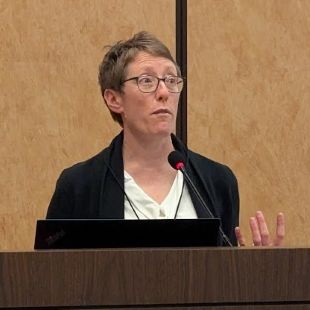 Credit: Getty Images
Credit: Getty Images
Rural Social Work Faces Scarcity of Resources, Ethical Concerns
By Paul R. Pace
 Credit: NASW/Paul Pace
Credit: NASW/Paul Pace
Social workers serving rural communities face challenges with their clients, a situation driven by a shortage of resources and professional visibility that can blur personal and professional boundaries.
Jess Bowers, associate professor and BSW program director at the University of Wisconsin-Stevens Point, hosted a presentation titled “Emerging Ethical Issues in Rural Social Work Practice,” at the recent NASW Wisconsin Chapter annual conference.
Bowers emphasized that the combination of demographic shifts and a tumultuous political landscape is creating more challenges than ever for rural social workers. The fundamental issue is making ethical choices, she said.
“I really like this quote by Potter Stewart: Ethics is knowing the difference between what you have a right to do and what is right to do,” Bowers said. Stewart (1915-1985) was an associate justice of the U.S. Supreme Court.
Bowers encouraged social workers to use the NASW Code of Ethics for navigating these pressures.
The most prevalent ethical issue Bowers identified—and audience members confirmed—is the deprivation of resources in rural communities. This problem has been exacerbated by a recent significant change in federal policy. The population density threshold for a community to be considered “rural” has doubled from 2,500 to 5,000 residents.
“The problem with that is that we're getting less federal resources,” Bowers explained, which trickles down to a reduction in crucial funding for services.
This resource gap is stark: Rural areas see slightly higher poverty rates and lower median per capita income than urban areas. Furthermore, though recognized as having higher rates of homelessness, rural communities possess only about a quarter of the available shelter capacity, Bowers said.
Dual Relationships and Loss of Privacy
Alongside resource constraints, attendees cited managing dual relationships and the resulting impact on their personal privacy as major concerns. In small communities, the separation between a social worker’s professional and private life is almost impossible to maintain, many attendees said.
Professionals routinely encounter clients in personal settings—at the grocery store, the DMV and church, for example. These unavoidable interactions, including clients unexpectedly showing up at a social worker’s home, create constant boundary issues.
Bowers urged social workers to “build in more space to process” these situations, acknowledging that many feel unsafe discussing ethical struggles for fear of being scrutinized for a “misstep.”
The Danger of the Savior Complex
Drawing on her 15 years of experience in child welfare and youth justice, Bowers underscored the importance of the profession’s core value: the importance of human relationships. She shared a candid personal case history as a cautionary tale on the risk of boundary drift.
She recalled a child welfare case involving a mother she had worked with years prior, a connection that caused her to become “too connected.” Bowers said she was driving the client to an AA meeting and taking calls after hours, for example.
“I was doing that at the detriment of her ability to build formal and informal supports,” Bowers stated, stressing the danger of the “savior complex.” She urged professionals to engage in continuous self-reflection to prevent a “series of small decisions” that leads to unethical boundary crossing.